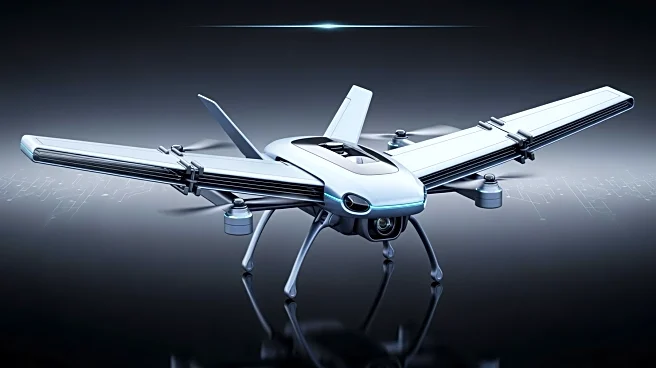What's Happening?
Anduril and the UAE's state-owned Edge Group have introduced a novel hover-to-cruise autonomous aircraft named Omen, with the UAE ordering the first 50 units. The Edge-Anduril Production Alliance, established in Abu Dhabi, aims to develop and produce
various platforms. Edge has invested $200 million in the project, contributing to local production and sales. Omen can switch between vertical takeoff and airplane-style flight, categorized as a Group 3 UAS. Anduril has been developing Omen since 2019, overcoming propulsion technology setbacks. The UAE's air force insignia appears on the model, although the buyer remains undisclosed.
Why It's Important?
The introduction of the Omen drone represents a significant advancement in autonomous flight technology, with implications for military and civilian applications. The ability to operate without traditional runways enhances operational flexibility, particularly in contested environments. The collaboration between Anduril and Edge highlights the growing importance of international partnerships in defense technology development. The investment and production in the UAE reflect a strategic move to bolster regional capabilities and influence. The drone's capabilities could impact U.S. defense strategies, particularly in terms of unmanned systems and hybrid technologies.
What's Next?
Full-rate production of Omen drones is expected by 2028, with potential workforce rotations between the UAE, the United States, and other countries. The alliance may lead to further technological developments and collaborations, potentially involving British and Australian personnel. The focus on runway-independent operations suggests a shift in military strategies, emphasizing flexibility and adaptability. The ongoing development and testing of the Omen drone will likely influence future defense procurement and operational strategies.
Beyond the Headlines
The ethical implications of autonomous flight technology include considerations of safety, accountability, and the potential for increased militarization. The cultural impact of international collaborations in defense technology may influence perceptions of national security and technological innovation. The long-term shifts could involve changes in global defense strategies and the role of unmanned systems in military operations.

















